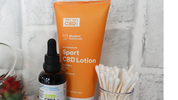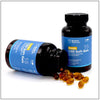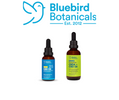The Ultimate Guide to THC vs CBD vs CBN: Understanding Their Differences & Uses
Introduction: Understanding THC vs CBD vs CBN

Cannabinoids are becoming increasingly popular in the wellness space, but understanding the differences between THC vs CBD vs CBN can help you choose the right products for your lifestyle.
-
THC (tetrahydrocannabinol) is the psychoactive compound responsible for the "high" associated with cannabis.
-
CBD (cannabidiol) is non-psychoactive and commonly used in wellness products.
-
CBN (cannabinol) is a lesser-known cannabinoid often associated with relaxation and nighttime use.
Each cannabinoid interacts with the endocannabinoid system (ECS) differently, influencing how they affect the body.
In this ultimate guide, we’ll break down:
-
What is CBD? (And how it compares to THC and CBN)
-
THC vs CBD: Key Differences & Uses
-
CBN vs CBD: How They Compare
-
How to Choose the Right Cannabinoid for You
-
Legal Considerations & FAQs
By the end of this guide, you’ll have a clear understanding of how THC, CBD, and CBN fit into a wellness routine, helping you make informed choices.
As of 2025, evolving research and changing legal frameworks are making it even more important to understand how each cannabinoid works.
What is CBD? Understanding This Popular Cannabinoid
CBD (cannabidiol) is one of the primary cannabinoids found in cannabis and hemp plants. Unlike THC (tetrahydrocannabinol), CBD is non-psychoactive, meaning it does not produce a high. Instead, it interacts with the body's endocannabinoid system (ECS) to help maintain balance.
How CBD Works in the Body
CBD interacts with the endocannabinoid system (ECS), a complex network of receptors.
The ECS includes CB1 receptors (primarily found in the brain and nervous system) and CB2 receptors (mostly in the immune system and peripheral tissues). Unlike THC, which binds directly to CB1 receptors, CBD has an indirect effect, influencing the ECS without causing intoxication.
Forms of CBD Products
CBD is available in various forms, including:
-
Full-Spectrum CBD – Contains all cannabinoids, including trace amounts of THC.
-
Broad-Spectrum CBD – Contains multiple cannabinoids but is THC-free.
-
CBD Isolate – Pure CBD with no additional cannabinoids.
CBD vs Other Cannabinoids (THC & CBN)
|
Cannabinoid |
Psychoactive? |
Primary Interaction |
Common Uses |
|
CBD (Cannabidiol) |
No |
Indirectly interacts with ECS |
General wellness, relaxation |
|
THC (Tetrahydrocannabinol) |
Yes |
Binds directly to CB1 receptors |
Recreational & medical use |
|
CBN (Cannabinol) |
Mildly |
Primarily affects CB2 receptors |
Often used in nighttime formulas |
Where Does CBD Come From?
CBD is extracted from hemp, a variety of the cannabis plant that contains low levels of THC (0.3% or less, as per U.S. regulations). It can be processed into:
-
CBD Isolate (pure CBD, no other cannabinoids)
-
Broad-Spectrum CBD (CBD + other cannabinoids, but THC-free)
-
Full-Spectrum CBD (CBD + all naturally occurring cannabinoids, including trace amounts of THC)
Understanding what is CBD and how it interacts with the body can help you decide whether it's the right fit for your wellness routine.
THC vs CBD: Key Differences & Uses

THC (tetrahydrocannabinol) and CBD (cannabidiol) are two of the most well-known cannabinoids found in cannabis and hemp plants. While they share some similarities in how they interact with the body's endocannabinoid system (ECS), they have distinct effects and applications.
Chemical Structure and How They Work
Both THC and CBD have the same molecular structure—21 carbon atoms, 30 hydrogen atoms, and 2 oxygen atoms. However, the arrangement of these atoms differs, leading to different interactions with the ECS.
-
THC binds directly to CB1 receptors, primarily found in the brain and nervous system. This interaction leads to the psychoactive effects commonly associated with cannabis.
-
CBD has an indirect influence on CB1 and CB2 receptors, modulating their activity without causing intoxication.
Psychoactive vs Non-Psychoactive Effects
-
THC produces psychoactive effects, leading to altered perception, mood changes, and euphoria.
-
CBD does not cause intoxication and is commonly used in wellness routines.
This difference makes THC more commonly associated with recreational cannabis use, while CBD is widely available in hemp-derived products that comply with federal legal standards.
THC vs CBD: Comparison Table
|
Feature |
THC |
CBD |
|
Psychoactive? |
Yes |
No |
|
Primary Receptor Interaction |
CB1 (brain, nervous system) |
Indirectly influences CB1 & CB2 |
|
Common Uses |
Recreational, medical use |
General wellness, relaxation |
|
Legal Status (U.S.) |
Varies by state |
Federally legal if derived from hemp with ≤0.3% THC |
|
Common Product Types |
Cannabis flower, edibles, tinctures |
Oils, capsules, topicals, gummies |
Why Some People Prefer THC-Free Products
Since THC produces psychoactive effects, some individuals prefer THC-free CBD options for their wellness needs. THC-free products include:
-
CBD isolate – Pure CBD with no other cannabinoids
-
Broad-spectrum CBD – Contains CBD and other cannabinoids, but no THC
Understanding the differences between THC vs CBD can help consumers choose the right cannabinoid for their personal preferences and lifestyle.
CBN vs CBD: How They Compare
CBN (cannabinol) and CBD (cannabidiol) are two non-psychoactive cannabinoids derived from the cannabis plant. While CBD is widely recognized and studied, CBN is a lesser-known compound that is gaining attention for its potential role in relaxation.
Learn More: How CBN and CBD Work Together for Sleep: Exploring Bluebird Botanicals' Downshift Blend
How CBN and CBD Are Formed
-
CBD is a primary cannabinoid found in hemp and cannabis plants. It is extracted directly from the plant and remains stable over time.
-
CBN is a byproduct of THC degradation. When THC is exposed to oxygen and light, it breaks down into CBN. This means that aged cannabis contains higher levels of CBN.
CBN vs CBD: Key Differences
|
Feature |
CBN |
CBD |
|
Origin |
Derived from aged THC |
Naturally present in cannabis and hemp |
|
Psychoactive? |
Minimally psychoactive |
No |
|
Interaction with Endocannabinoid System |
Primarily affects CB2 receptors |
Indirectly influences CB1 and CB2 receptors |
|
Common Product Types |
Oils, capsules, gummies |
Oils, capsules, topicals, gummies |
|
Pairing with Other Cannabinoids |
Often combined with CBD for enhanced relaxation |
Commonly used in full-spectrum and broad-spectrum products |
Why People Combine CBN and CBD
Many products combine CBN with CBD to create a balanced formula. The two cannabinoids interact with the ECS in different ways, leading some people to prefer blended cannabinoid formulations over single-compound products.
For example, Bluebird Botanicals’ Downshift CBN + CBD Oil contains a 4:1 ratio of CBD to CBN, providing a combination of cannabinoids in a THC-free formulation.
How to Choose Between CBN and CBD
-
For a versatile, all-day option: CBD is widely used as part of a wellness routine.
-
For evening or relaxation purposes: Some people prefer products with CBN due to its calming properties.
-
For those avoiding THC completely: Both CBD isolate and THC-free CBN products offer cannabinoid support without THC exposure.
Understanding CBN vs CBD helps consumers make informed choices when selecting cannabinoid products that fit their lifestyle.
How to Choose the Right Cannabinoid for You

With so many cannabinoid products available, choosing between THC, CBD, and CBN depends on your individual preferences and wellness goals. Understanding how each cannabinoid works can help guide your decision.
Factors to Consider When Choosing a Cannabinoid
1. Psychoactive Effects
-
If you prefer a non-psychoactive option, CBD or CBN may be a better choice.
-
If you are comfortable with psychoactive effects, THC-containing products might align with your needs.
2. Desired Use Case
-
CBD is commonly used for general wellness and relaxation throughout the day.
-
CBN is often included in nighttime formulations for those looking to wind down.
-
THC is primarily found in recreational cannabis products and state-regulated medical applications.
3. Legal Considerations
-
CBD derived from hemp (≤0.3% THC) is federally legal in the U.S.
-
THC legality varies by state, with some allowing recreational use and others limiting it to medical programs.
-
CBN is not as heavily regulated but may fall under legal gray areas depending on its source.
4. Product Preferences
-
If you prefer oils or tinctures, both CBD and CBN are widely available in liquid form.
-
If you want pre-measured servings, capsules and gummies offer a convenient way to consume cannabinoids.
-
If you enjoy topical applications, CBD creams and balms are a great option for external use.
THC vs CBD vs CBN
| Feature | THC | CBD | CBN |
|---|---|---|---|
| Psychoactive? | Yes | No | Mild |
| Primary Effect | Euphoria, altered perception | Relaxation, balance | Calming, sleep support |
| Common Use Time | Recreational, medical use | Daytime, general wellness | Evening, pre-sleep routines |
| Product Types | Flower, edibles, vape, tincture | Oils, gummies, topicals | Oils, gummies, tinctures |
| Legal Status (U.S.) | Varies by state | Federally legal (≤0.3% THC) | Legal gray area |
Choosing the Right Bluebird Botanicals Product
|
Goal |
Recommended Product |
Key Features |
|
Daily Wellness & Balance |
Classic CBD Oil |
Full-spectrum CBD oil for everyday use |
|
Evening Relaxation |
Downshift CBN + CBD Oil |
Blend of CBN and CBD in a THC-free formulation |
|
THC-Free Options |
THC-Free CBD Gummies |
No THC, convenient, and portable |
|
On-the-Go Use |
CBD Roll-On |
Easy application, infused with botanical ingredients |
By considering your personal preferences and learning about THC vs CBD vs CBN, you can confidently select the cannabinoid that best aligns with your wellness routine.
Legal Considerations & FAQs
Understanding the legal landscape of THC vs CBD vs CBN is essential before purchasing or using cannabinoid-based products. While hemp-derived CBD is widely accessible, THC and CBN have varying regulations depending on location.
Legal Status of THC, CBD, and CBN
CBD
-
Federally legal in the U.S. if derived from hemp and contains no more than 0.3% THC (2018 Farm Bill).
-
Some states have additional restrictions on CBD products.
THC
-
Legal status varies by state in the U.S.
-
Some states allow medical use only, while others have fully legalized THC for recreational use.
-
Federally, THC remains a controlled substance under U.S. law.
CBN
-
Legal status is unclear because CBN is derived from THC degradation.
-
Most CBN products on the market come from hemp-derived sources, making them likely legal in the U.S., but regulations are evolving.
Consumers should always check state-specific laws before purchasing THC or CBN products, as regulations may differ.
Frequently Asked Questions (FAQs)
1. Will CBD, THC, or CBN show up on a drug test?
-
CBD isolate and broad-spectrum CBD should not result in a positive drug test since they contain no THC.
-
Full-spectrum CBD may contain trace amounts of THC, which could be detected in certain tests.
-
CBN has a chemical similarity to THC, and some drug tests may mistakenly identify it as THC.
2. Can I travel with cannabinoid products?
-
CBD products containing ≤0.3% THC are federally legal in the U.S. and permitted on domestic flights.
-
THC-containing products are restricted and cannot be carried across state lines if traveling between states with different cannabis laws.
-
International travel with cannabinoids is risky, as laws vary widely by country.
3. How do I know if a CBD or CBN product is high quality?
Look for products that meet the following criteria:
-
Third-party lab tested for purity and potency.
-
Clearly labeled cannabinoid content with Certificates of Analysis (COA).
-
Sourced from reputable companies that follow industry standards.
4. Are there side effects of CBD or CBN?
-
Most people tolerate CBD and CBN well.
-
Possible mild effects may include dry mouth, dizziness, or drowsiness.
-
Consumers should consult a healthcare professional before using cannabinoids, especially if taking other medications.
5. Is CBN legal in the United States?
-
CBN derived from hemp is generally legal under the 2018 Farm Bill if it contains less than 0.3% THC.
-
Because CBN is a byproduct of THC, its legal status can vary by state.
-
Always check your state’s regulations before purchasing CBN products.
What’s New in 2025: Cannabinoid Trends to Watch
As we move through 2025, several trends are shaping how THC, CBD, and CBN are used and understood:
-
More consumer demand for CBN in sleep-focused products, especially gummies and tinctures. (highlighted in recent cannabis trend report)
-
Legal changes across U.S. states are expanding access to both THC and hemp-derived CBD products. (NORML 2025 Cannabis Legislation Tracker).
-
Product innovation in full-spectrum and THC-free blends that include CBN for nighttime use.
-
Greater emphasis on transparency, with more brands offering detailed third-party lab results and QR codes on packaging.
Staying informed about these shifts can help you choose the right products and stay ahead of the curve.
Conclusion
The growing interest in THC vs CBD vs CBN reflects how cannabinoids are becoming an integral part of many wellness routines. Each compound has distinct characteristics, making it important to understand their differences before choosing the right product.
Key Takeaways
-
CBD is non-psychoactive and commonly used for balance and relaxation.
-
THC produces psychoactive effects and is regulated differently across states.
-
CBN is mildly psychoactive and often included in nighttime formulations.
-
The legal status of these cannabinoids varies, so it’s essential to check local laws before purchasing.
Bluebird Botanicals offers high-quality, third-party tested CBD and CBN products for those looking to explore cannabinoids in a THC-free format.
Find the Right Cannabinoid for Your Wellness Routine
If you're ready to explore CBD and CBN products, Bluebird Botanicals provides:
-
CBN-infused formulations for relaxation
-
THC-free options for a non-intoxicating experience
Explore our premium CBD and CBN offerings today.
Disclaimer:
This article is for informational purposes only and is not intended to diagnose, treat, cure, or prevent any medical condition. The statements regarding CBD and sleep have not been evaluated by the Food and Drug Administration (FDA). Please consult with a healthcare professional before starting any new supplement.









